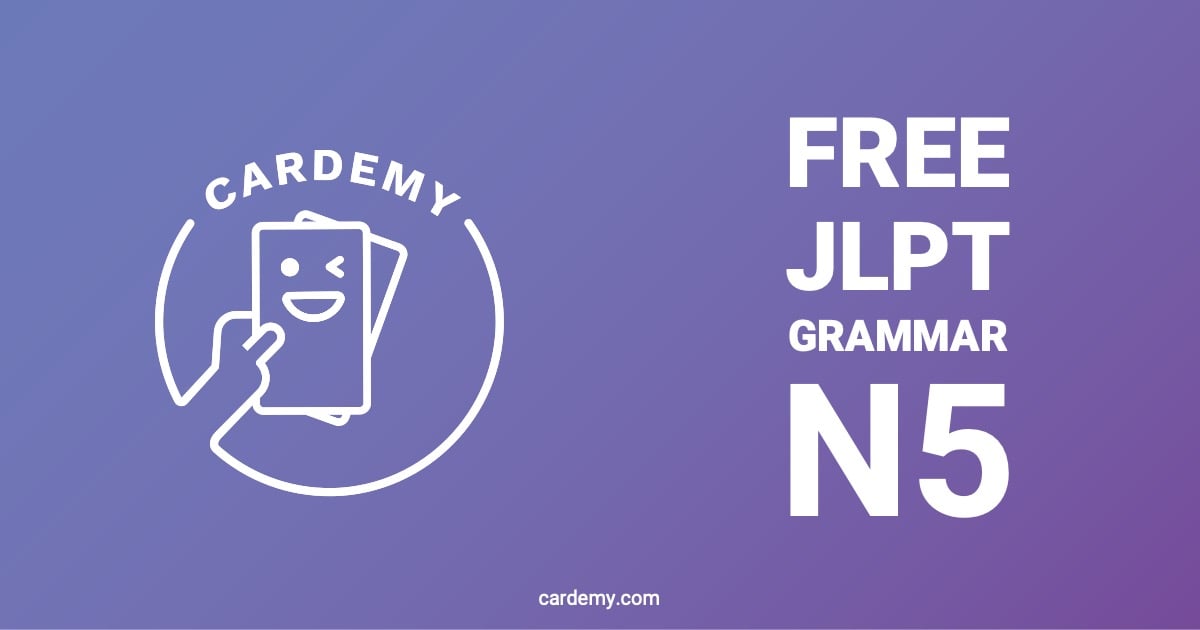What are the Japanese particles?
A particle follows the word it targets to indicate its function in the sentence (e.g. theme, subject, direct object, place, etc.). In the Japanese language, particles have an important role.
The theme particle 「は」wa
The particle は indicates that the noun before it is the theme. The theme refers to what is being talked about in the sentence, i.e., about what new information is going to be provided.
The theme is not necessarily the grammatical subject of the sentence. The subject and the theme should not be confused.
The particle は can be roughly translated as "about" or "concerning".
Although we write "は" (normally pronounced "ha"), we pronounce "wa".
(例)
ニコラはフランス 人だ。Nicolas is French (Regarding Nicolas, he is French).
The structure 「noun + は」 also allows us to construct an interrogative sentence.
(例)
A:お 名前は?What's your name? (Regarding your name?)
B:山田です。My name is Yamada (It's Yamada).
In Japanese, we omit what is obvious in the context. For example, in the second sentence below, the question is about Yamada's "little job" when "little job" is not mentioned.
(例)
Suzuki:今日はアルバイトだ。山田さんは?
Today I'm going to my little job (Today is little job.) Are you going to your little job, Yamada? (About you, Yamada?)
Yamada:私は、明日。 I'm going to my little job tomorrow (Concerning me, it's tomorrow).
The theme is not necessarily the grammatical subject of the sentence. The subject and the theme should not be confused.
The particle は can be roughly translated as "about" or "concerning".
Although we write "は" (normally pronounced "ha"), we pronounce "wa".
(例)
ニコラはフランス 人だ。Nicolas is French (Regarding Nicolas, he is French).
The structure 「noun + は」 also allows us to construct an interrogative sentence.
(例)
A:お 名前は?What's your name? (Regarding your name?)
B:山田です。My name is Yamada (It's Yamada).
In Japanese, we omit what is obvious in the context. For example, in the second sentence below, the question is about Yamada's "little job" when "little job" is not mentioned.
(例)
Suzuki:今日はアルバイトだ。山田さんは?
Today I'm going to my little job (Today is little job.) Are you going to your little job, Yamada? (About you, Yamada?)
Yamada:私は、明日。 I'm going to my little job tomorrow (Concerning me, it's tomorrow).
私は学生だ。
I am a student. (As for me, I am a student.)
今日は雨じゃない。
Today it's not raining. (Regarding today, it's not raining.)
私はラーメン。
As far as I'm concerned, I'll take a ramen.
The theme inclusive particle 「も」mo
This particle is similar to は, but it adds the meaning of "also" in the affirmative sentence or "neither" in the negative sentence.
When there is an opposition of ideas, は should be used, not も.
(例)
A:ニコラは 先生?
B:うん。あと、メラニーも 先生。
A:ニコラは 先生?
B:ううん、でもメラニーは 先生。
A:ニコラは 先生?
B:ううん、あとメラニーも 先生じゃない。
When there is an opposition of ideas, は should be used, not も.
(例)
A:ニコラは 先生?
B:うん。あと、メラニーも 先生。
A:ニコラは 先生?
B:ううん、でもメラニーは 先生。
A:ニコラは 先生?
B:ううん、あとメラニーも 先生じゃない。
The identification particle 「が」ga
Some sentences have no theme but use the subject identification particle が.
Sentences without theme are used as follows:
1) When describing an event as it is perceived through one of the five senses.
(例)
見て、あそこにねこがいる。Look, there's a cat over there.
音楽が 聞こえる。I hear music.
2) When new information is given or asked for.
(例)
今日、パーティーがある。Today there is a party.
In sentences beginning with interrogative words, we put が after the interrogative word. This is because we are asking for new information. When we answer, we also use the particle が.
A:誰が 先生?Who is the teacher? (Who is the one who is a teacher?)
B:彼が 先生。He is the one (He is the one who is a teacher).
Note well the difference subtitle with the particle は which does not identify the subject:
A:先生は 誰?Who is the teacher? (As for the teacher, who is he?)
B:先生は 彼。It's him (Concerning the teacher, who is he).
Sentences without theme are used as follows:
1) When describing an event as it is perceived through one of the five senses.
(例)
見て、あそこにねこがいる。Look, there's a cat over there.
音楽が 聞こえる。I hear music.
2) When new information is given or asked for.
(例)
今日、パーティーがある。Today there is a party.
In sentences beginning with interrogative words, we put が after the interrogative word. This is because we are asking for new information. When we answer, we also use the particle が.
A:誰が 先生?Who is the teacher? (Who is the one who is a teacher?)
B:彼が 先生。He is the one (He is the one who is a teacher).
Note well the difference subtitle with the particle は which does not identify the subject:
A:先生は 誰?Who is the teacher? (As for the teacher, who is he?)
B:先生は 彼。It's him (Concerning the teacher, who is he).
誰が友達?
Who is your friend? (Who is the one who is your friend?)
Exercices
Make a sentence using the theme particle は .
(例)先生。(theme: 彼 )→ 彼は 先生。
(例)先生。(theme: 彼 )→ 彼は 先生。
誰?(彼女)
Answer →
彼女は誰?
Translation →
Who is she?
いつ?(試験)
Answer →
試験はいつ?
Translation →
When is the exam?
何?(あれ)
Answer →
あれは何?
Translation →
What is it?
どう?(日本)
Answer →
日本はどう?
Translation →
How is Japan?
先生だ。(山田さん)
Answer →
山田さんは先生だ。
Translation →
M.(Mrs.) Yamada is a teacher.
友達だ(ニコラ)
Answer →
ニコラは友達だ。
Translation →
Nicolas is my friend.
晴れだ(今日)
Answer →
今日は晴れだ。
Translation →
It is sunny today.
ここ?(トイレ)
Answer →
ここはトイレ?
Translation →
Are toilets here?
アメリカ人だ。(リンダ)
Answer →
リンダはアメリカ人だ。
Translation →
Linda is american.
休み?(明日)
Answer →
明日は休み?
Translation →
Tomorrow is a day off?
Complete with は or も in 〇."
今日は晴れだ。昨日〇晴れだった。
Answer →
今日は晴れだ。昨日(も)晴れだった。
Translation →
Today it is sunny. Yesterday it was also sunny.
メラニーはフランス人だ。でも、私〇フランス人じゃない。
Answer →
メラニーはフランス人だ。でも、私(は)フランス人じゃない。
Translation →
Melanie is French. But I am not French.
それは手帳。これ〇そうだ。
Answer →
それは手帳。これ(も)そうだ。
Translation →
This one is an agenda. This one is also (an agenda).
アルバイトは明日だ。今日〇アルバイトじゃなかった。
Answer →
アルバイトは明日だ。今日(は)アルバイトじゃなかった。
Translation →
My little job is tomorrow, not today.
父は医者。あと兄〇医者。
Answer →
父は医者。あと兄(も)医者。
Translation →
My father is a doctor. And my older brother is also a doctor.
Complete with は, もor が in 〇.
A: トイレ 〇 どこ?
B: そこ 〇 トイレ。
B: そこ 〇 トイレ。
Answer →
A: トイレ は どこ?
B: そこ が トイレ。
B: そこ が トイレ。
Translation →
A : Where are the toilets?
B : The toilets are there.
B : The toilets are there.
A: これ 〇 何?
B: これ 〇 ゲーム。
A: それ 〇 ゲーム?
B: ううん、それ 〇 ゲームじゃない。
B: これ 〇 ゲーム。
A: それ 〇 ゲーム?
B: ううん、それ 〇 ゲームじゃない。
Answer →
A: これ は 何?
B: これはゲーム。
A: それ も ゲーム?
B: ううん、それ は ゲームじゃない。
B: これはゲーム。
A: それ も ゲーム?
B: ううん、それ は ゲームじゃない。
Translation →
A : What is it?
B : These are games.
A : Are these games too?
B : No, these are not games.
B : These are games.
A : Are these games too?
B : No, these are not games.
A: 彼女 〇 誰?
B: 彼女 〇 山田さん。 先生だよ。
B: 彼女 〇 山田さん。 先生だよ。
Answer →
A: 彼女 は 誰?
B: 彼女 は 山田さん。 先生だよ。
B: 彼女 は 山田さん。 先生だよ。
Translation →
A : Who is she?
B : It's Mrs. Yamada. She is a teacher.
B : It's Mrs. Yamada. She is a teacher.




Leave Comment